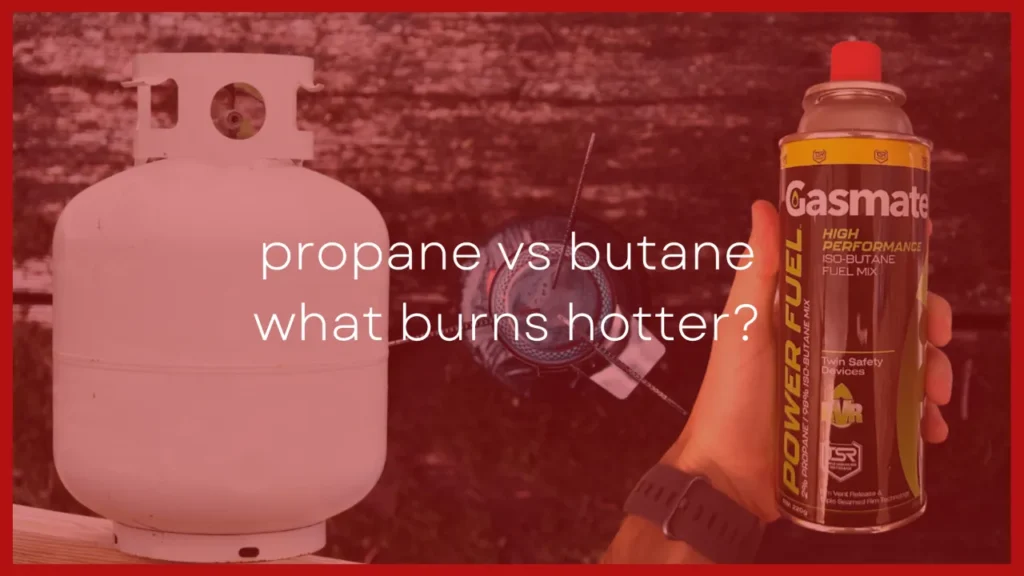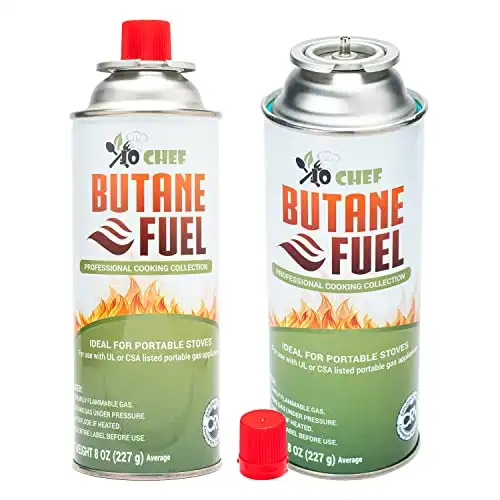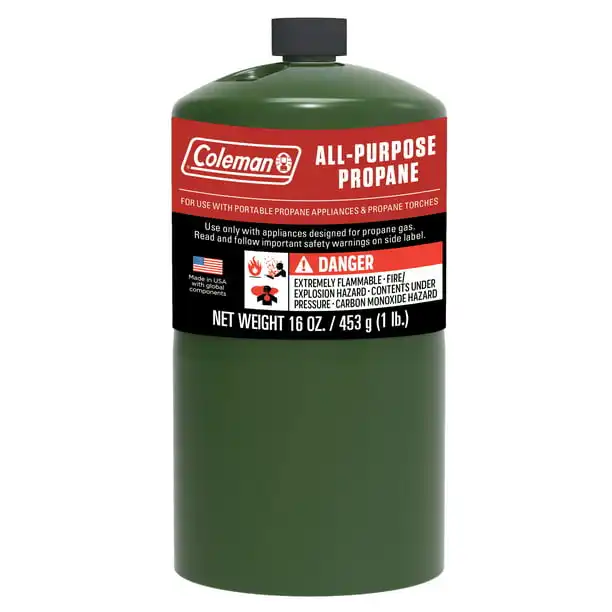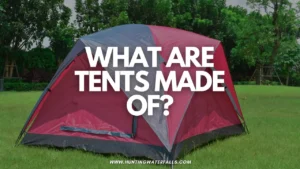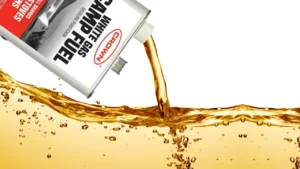Propane and butane are both popular LPG fuel types for powering your camping stove and more. However, understanding their differences and how they operate in different conditions and which burns hotter can help you choose the right one for your needs.
Propane burns hotter than butane. A propane torch flame can reach maximum temperatures of 3,600ºF / 2,000ºC whereas a butane torch flame can only reach a maximum temperature of 2,610ºF / 1,430ºC.
Propane burns hotter because it has more slightly more energy per weight than butane and has a higher flame temperature and flame velocity which leads to a faster heat transfer when compared to butane.
Propane is also slightly more energy dense when compared to butane. Propane has a BTU/lb rating of 21,700, while butane rates only 20,900. Propane is also better to use in cold temperatures because it has a lower vaporization point. It’s also denser and more fuel efficient compared to butane.
Where this difference is most apparent is in welding torches. A propane torch can reach a maximum temperature of around 3,600ºF / 2,000ºC whereas a butane torch can only reach temperatures of around 2,610ºF / 1,430ºC. (source: propane torch, butane torch – wikipedia)
However, when it comes to household/camping uses such as stove both propane and butane have a very similar heat output and the difference will be hardly noticeable. Propane will perform slightly better, but you'll notice little to no difference in cooking times.
If you’re trying to decide between butane and propane, consider factors such as the external temperature as this will affect how efficiently the fuel runs.
Propane and Butane: The Differences Explained
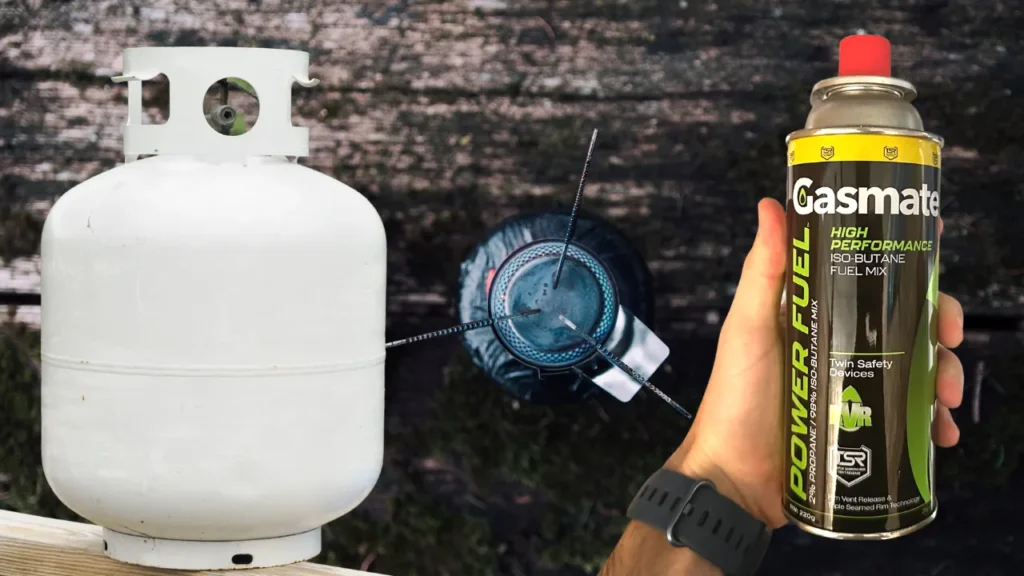
Here is a helpful table explaining the main differences between these two popular fuel types:
| Propane | Butane | |
|---|---|---|
| Classification | LPG (Liquid Petroleum Gas) | LPG (Liquid Petroleum Gas) |
| BTU per lb | 21,700 | 20,900 |
| MJ per kg | 50.35 | 49.50 |
| Boiling Point | -43℉ / -41ºC | 30ºF / -1ºC |
| Flame Temperature | 3,600ºF / 2,000ºC | 2,610ºF / 1,430ºC |
| Efficiency | Can be used indoors but require ventilation | Can use indoors in a well-ventilated space |
| Price | Relatively inexpensive | Not as costly as propane |
| Availability | More widely available | Widely available |
| Size | Larger canisters (1-30+ lbs) | Typically smaller canisters |
Fuel Efficiency
Propane has more molecules per ounce than butane, making it denser and more fuel efficient. It also has more energy per ounce than butane and has a BTU per pound rating of 21,700 compared to butane’s 20,900 (source: wikipedia).
Propane's flame temperature and flame velocity is also higher, allowing you to cook your food or boil water faster.
That means that even if the energy stored in a given volume of butane were slightly higher (it’s not), you’d get the energy out of the propane faster.
Peter W. Rowe M.F.A., G.G. – Juxtamorph
In addition, propane combusts more readily than butane, while butane liquefies more easily.
Use in Cold Weather
Since propane has a much lower boiling point, it will vaporize in lower temperatures than butane. This makes it better to use in winter and when camping in freezing temperatures as butane becomes ineffective in such conditions.
You can also safely store your propane canisters outdoors without worrying about the fuel quality being affected.
Emissions
Butane and propane produce carbon monoxide, carbon dioxide, water vapor and sooty residue when burned.
Although they both release fewer emissions than gasoline and kerosene, if you want to use propane or butane indoors, you should ensure that the area is very well-ventilated.
Price and Availability
Butane isn’t as expensive as propane but it usually comes in smaller canisters, making it inconvenient for longer camping trips. It’s also not as widely available as propane.
The most common size for a butane canister is 8oz (such as the Jo Chef Butane Canister from Amazon) and you’ll need a few of them for a week-long camping trip.
Ultra-convenient 8.8oz pre-filled canisters available in single| 2 cartridge pack | 3 cartridge pack | 4 cartridge pack cartridges.
Unfortunately, most butane canisters aren’t refillable, and it can be dangerous to refill a non-refillable one.
Propane often comes in larger cylinders and a common size for camping stoves is 1 lb. This Flame King Propane Cylinder from Amazon is a good example but you can also buy them from gas stations or camping stores.
The Coleman® All-Purpose Propane Camping Gas Cylinder provides 16oz of clean-burning, portable propane fuel.
They also come in larger sizes and you can hook up a 30 lb tank to your RV to run various appliances. This guide explains how long a 30 lb propane tank lasts.

